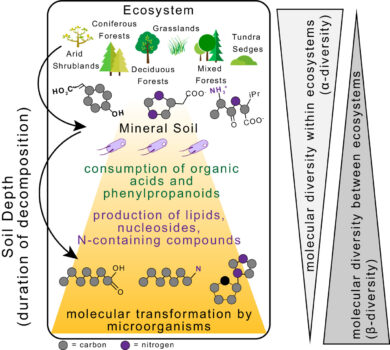Soil Organic Matter molecular diversity is influenced by microbial degradation

Science
Soil organic matter (SOM) inputs, such as leaf litter, are degraded by microbes within the soil. ENIGMA researchers, collaborating with the Lehmann Lab at Cornell University, hypothesized that the diversity of biochemicals within the SOM would decrease with microbial degradation. They found that while the degradation products that accumulate at lower depths have low richness and diversity within ecosystems (upper and left), there is increased diversity between ecosystems (left) suggesting microbial community, mineralogy, and soil conditions such as pH and oxygen availability may impact the molecular transformations that occur.
Impact
This work advances the current understanding of how soil microbial communities interact with their environments, indicating that microbial decomposition drives significant variability in the molecular richness and diversity of SOM between soil horizons and ecosystems. Their approach applied commonly used mathematical models for interpreting microbial community richness and diversity to SOM. Validation of these tools provides an important avenue to studying critical soils impacted by human activity.
Summary
Litter and soil horizons were collected from six ecologically distinct locations: arid shrubs; coniferous, deciduous, and mixed forests; grasslands; and tundra sedges. Soils were characterized by pH, elemental analysis, dissolved organic carbon content, total soil organic carbon and nitrogen. Soil temperature, precipitation, and aridity were recorded from the WorldClim 2.0 dataset. Near edge X-ray absorption fine structure (NEXAFS) spectroscopy and fourier-transform infrared spectroscopy (FTIR) were used to further characterize the organic carbon, while molecular identifications were made using mass spectrometry and the Global Natural Products Social Molecular Networking (GNPS) database. Molecular richness and diversity calculations were adapted from indices commonly used for community analysis. Researchers found that molecular diversity decreased with microbial transformation of soil organic matter inputs (such as leaf litter) within ecosystems, but that diversity between ecosystems increased.

Contact
Trent Northen (trnorthen@lbl.gov) and Ben Bowen (BPBowen@lbl.gov)
Lawrence Berkeley National Laboratory
Funding
This material, provided by ENIGMA (Ecosystems and Networks Integrated with Genes and Molecular Assemblies), a Science Focus Area Program at Lawrence Berkeley National Laboratory, is based on work supported by the U.S. Department of Energy, Office of Science, and the Office of Biological & Environmental Research. Work at Cornell University was supposed by a Schmittau-Novak Small Grant.
Publications
Davenport, R., Bowen, B.P., Lynch, L.M., Kosina, S.M., Shabtai, I., Northen, T.R., and Lehmann, J.”Decomposition decreases molecular diversity and ecosystem similarity of soil organic matter”. United States. DOI: 10.1073/pnas.2303335120. OSTI
